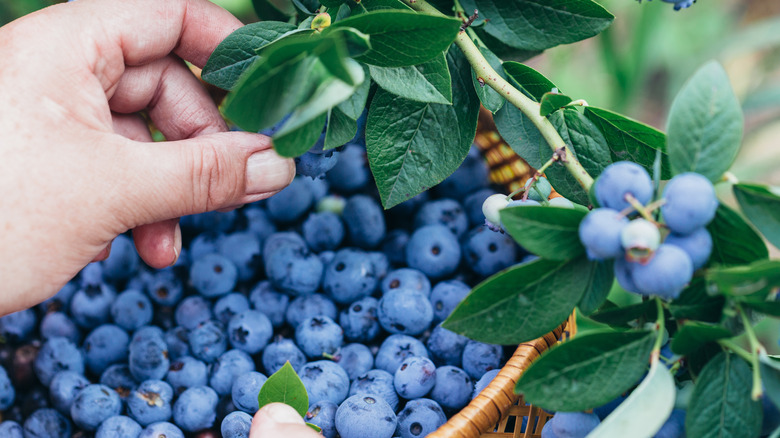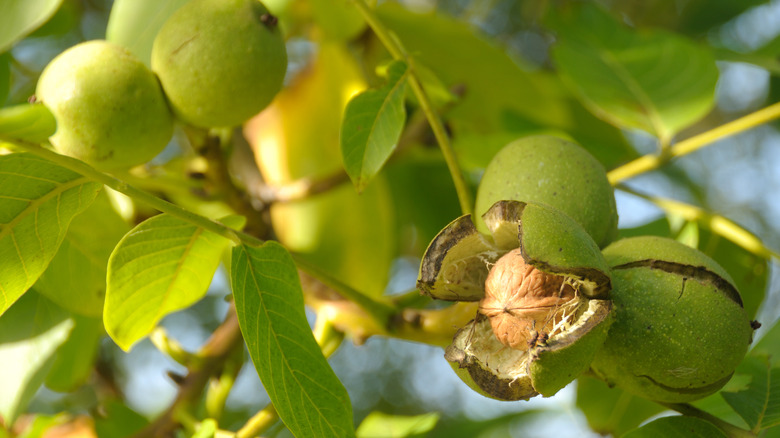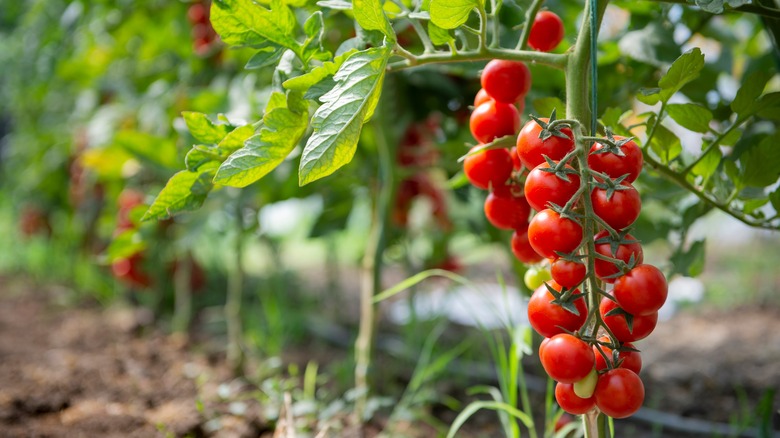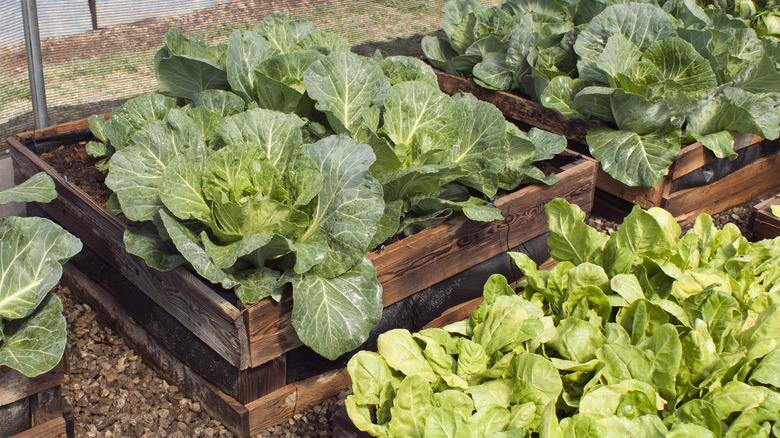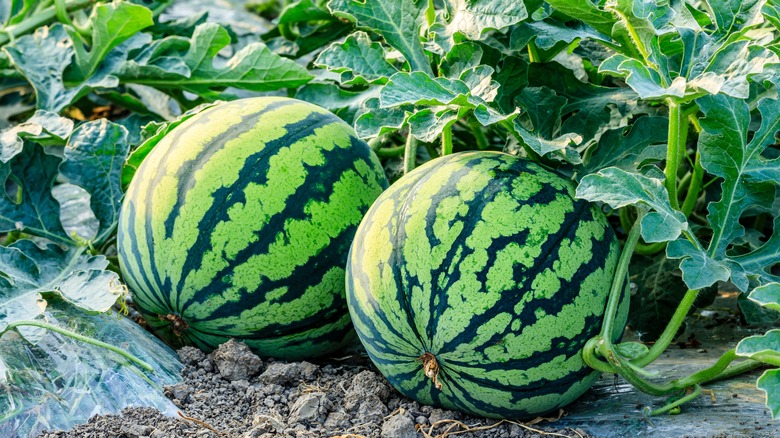Plants You Should Never Plant Anywhere Near Your Blueberries
The best thing about blueberries is that they can grow all over the United States, and are also nutrient-dense and full of antioxidants. This means that they make a great addition to your garden and diet. However, the problem with blueberries is that they take a lot of care and patience to grow. To help them along, many gardening websites suggest planting blueberries with specific companion plants that can help the blueberry bushes become stronger and keep away pests. Blueberries require acidic soil, so the plants you grow near them should also enjoy low pH soil of around 4.5 to 5 (via Redemption Permaculture). Some plants that enjoy these conditions include basil, borage, dill, strawberries, cranberries, parsley, and rhododendrons.
However, just as there are plants that grow well with blueberries, there are others you should avoid planting anywhere near them because they will negatively affect the growth and flavor of the end product. Unfortunately, many of these plants are common garden vegetables like tomatoes, potatoes, and cabbage. Because of this, for best results, you may want to plant your blueberry bushes far away from your vegetable patch in a separate area of your yard.
Avoid planting near trees, especially walnut trees
Blueberry bushes don't like to be planted near trees in general because they block the sun. Blueberries require at least a few hours of direct sunlight per day, so it is important to plant your blueberry bushes somewhere sunny and away from trees and other bushes. If this is not possible, you can grow blueberries in partial shade, although they may not grow as well. However, if you have to plant your blueberry bushes next to a tree, you should make sure that it isn't a walnut tree because walnut trees release a chemical called juglone from their roots which is toxic to blueberries.
Luckily the juglone toxin doesn't travel far and typically remains in the soil only in the area where the walnut tree roots are located. However, according to the University of Wisconsin-Madison, mature walnut trees can have roots that extend 50 to 60 feet from the trunk. This means that to be safe, you will need to plant your blueberry bushes at least that far away from any walnut trees. If not, the juglone toxin may cause your blueberry bushes to be stunted and possibly die.
Nightshades and blueberries don't mesh
Nightshades are a family of plants that include poisonous species like belladonna and mandrake but also some delicious common veggies like tomatoes, potatoes, peppers, and eggplants. Nightshades in particular don't grow very well next to blueberry bushes simply because the two plants prefer different types of soil. While blueberries prefer acidic soil, nightshades grow best in soil that is more alkaline. This means that if planted near each other, your tomatoes or potatoes will be working to bring the pH of the soil up while the blueberries will try and bring them down. This will result in poor growth and fruit yield from both plants.
However, this doesn't mean you can never grow both blueberries and tomatoes or potatoes at the same time. Instead, test your soil to see if it is naturally more acidic or alkaline. If it is more acidic, plant your blueberries in the ground and grow your tomatoes in pots. If the soil is more alkaline, do it the other way around. According to the University of Maryland, it is possible to grow blueberry bushes in pots as long as they are at least 24 inches wide and deep.
Brassicas are tough competitors
Brassica vegetables are a large group of plants that include anything related to mustard and cabbage, from radishes and kale to bok choy and collard greens. Brassicas are commonly found in gardens because they are often used in cooking and are easy to grow. However, you should never plant a brassica near your blueberry bushes for multiple reasons. The first is that, like nightshades, brassicas prefer more alkaline soil and will negatively impact the soil near your blueberry bushes if they are growing too close together.
On top of this, brassicas and blueberries need the same nutrients and will compete with each other for both nutrients and water if in the same general area. Because brassicas are faster growing, this may mean that they will win against your blueberry bushes and will make it hard for the blueberries to grow and thrive. Finally, brassicas tend to attract garden pests that also enjoy munching on blueberries. So, if you want to have both blueberries and brassicas in your yard, it's best to keep them far apart.
Melons are too thirsty for blueberries
Plants in the melon family — like watermelon, cantaloupe, and honeydew — don't do particularly well when planted together with blueberries for multiple reasons including that they prefer alkaline soil and will compete for the same nutrients. However, the biggest reason you shouldn't plant any melons near your blueberry bushes is because they are very thirsty plants and can deplete the soil of water. This is often bad for blueberries, which require moist soil to thrive.
In fact, according to the Farmer's Almanac, blueberry bushes need around one to two inches of water per week and also require the soil to be protected so that the roots of the plant stay moist. Because of this, most gardeners choose to cover the ground near their blueberry bushes in around two to four inches of wood chips, pine needles, or sawdust. Others choose low-growing companion plants like strawberries or bush beans to help cover the earth and keep the soil moist.
Other plants that don't get along with blueberries
The biggest issue with growing blueberries is their need for acidic soil which is difficult for many other plants to adjust to. This means that if blueberry bushes are thriving in your yard, in all likelihood, many other plants won't. Besides the ones mentioned previously, other plants that prefer alkaline soils include herbs like sage, cilantro, fennel, and oregano. It also includes other veggies like squash, beets, rhubarb, peas, onions, and leeks as well as flowers like sunflowers and lavender.
Furthermore, blueberry bushes tend to have a shallow root system that only reaches about six to 12 inches deep. This means that any other plants that have a quick spreading deep root system can be harmful to blueberry bushes. This is especially true of invasive plants like the tree of heaven and creeping bellflower.
In general, blueberry bushes do best with other companion plants or in a grove of other blueberry bushes when planted around four to five feet apart. While it may seem a bit complicated now, harvesting fresh, juicy, and sweet blueberries from your own backyard every year is worth making sure these bushes are growing in their ideal conditions.
